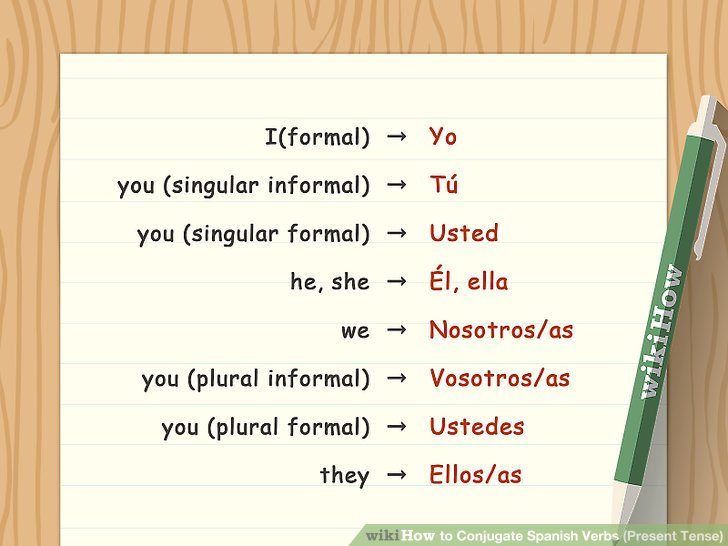Click to see all conjugation charts of poder in every tense
In this conjugation lesson we will see how to conjugate the verb poder in the Presente tense of the Indicativo mood. It means we will see step by step how to create and translate forms of each grammatical person.
This lesson is specifically about the poder verb conjugation. For an overview of all the Simple Tenses conjugation have a look at the Simple Tenses Conjugation Chart.
You may also see this Video Presentation on how to conjugate verbs in Presente. It’s embedded below, but using the above link you may find additional information on conjugation in this tense and explanation of exceptions and special cases.
How to translate Presente to English
Note that the phrases in English provided below next to each conjugation are not direct translations from Spanish to English. They are usually the closest general equivalents. The example differences are:- In Spanish conjugation, there is the form usted in the third person singular. But this person does not translate to the English third person singular. It translates to the so called formal you and uses the inflected form which is most often represented as he/she/it in English conjugation charts.
- Similar situation happens in the third person plural, where ustedes translates to the English plural formal you but uses the form which corresponds to the they form in English.
- Tenses are used differently in Spanish and English, so the actual translation should always take into account the context and focus on translating the meaning, not just words.
- In both languages each verb may have multiple meanings and not every meaning translates directly to the other language. Here also, the context and focusing on the particular meaning helps to create the most accurate translation.
The Spanish Presente de Indicativo tense translates to one of the following:
- The English Present tense, for instance: ustedes pueden(formal, plural) you are able
- The English Present Progressive (or Present Continuous) tense, for instance:hoy usted puede(formal) you are being able today
Notice that the Spanish equivalent of the Present Progressive also exists and is in common use – that’s Presente Progresivo (or Presente Continuo).
Note the timeline
The ability to correctly locate the desired position on the timeline is a crucial skill for proper choice of tenses. So note the timeline in our lessons and visualize it while listening, speaking, writing and reading. After some practice you’ll be able to select the right tense to use much easier.
Step by step instructions
Presente belongs to the simple tenses group, which means that all of its conjugated forms are one word long. There are also compound (compuesto) tenses in the Spanish language, where each inflected form consists of two words. The verb poder has an irregular conjugation in the Presente tense of the Indicativo mood. The first person singular has an irregular stem in this tense.This verb belongs to the group which gets a change of the last o in the stem into an ue.
It’s convenient to think about this change as happening only in Presente de Indicativo, persons 1st, 2nd, 3rd singular and 3rd plural, and whatever it influences later on (like the Imperativo) it never gets beyond the above mentioned persons.
And why does this change influence the other tenses? Simply because their forms are created based on the 3rd person singular of Presente de Indicativo. So just remembering that this verb is affected by this change and that the change doesn’t propagate to other persons – you are able to properly create forms of three other tenses!
So in the regular stem pod change o to ue to get pued. But at least the ending is regular for this person. It is -o as normally in the -er verb group. Add it to the stem to get:
- yo puedo – I am able
So as explained earlier we need to change o to ue in the regular stem pod to get pued. Similarly the ending is regular for this person. It is -es as normally in the -er verb group. Add it to the stem to get:
- tú puedes – you are able
So as explained before we need to change o to ue in the regular stem pod to get pued. Also as in the previous case the ending is regular for this person. It is -e as normally in the -er verb group. Add it to the stem to get:
- él puede – he is able
- ella puede – she is able
- usted puede – (formal) you are able
- nosotros podemos – we are able
- nosotras podemos – (feminine) we are able
- vosotros podéis – (plural) you are able
- vosotras podéis – (feminine, plural) you are able
So as explained before we need to change o to ue in the regular stem pod to get pued. Once more the ending is regular for this person. It is -en as normally in the -er verb group. Add it to the stem to get:
- ellos pueden – they are able
- ellas pueden – (feminine) they are able
- ustedes pueden – (formal, plural) you are able
That’s it! The conjugation is now complete. Put together, the conjugation chart looks like this:
| yo | puedo | I am able |
| tú | puedes | you are able |
| él/ella/usted | puede | he/she/it is able |
| nosotros/nosotras | podemos | we are able |
| vosotros/vosotras | podéis | you are able |
| ellos/ellas/ustedes | pueden | they are able |
But do not end your session yet – it’s important to repeat and practice the material in order to retain it. Check below for example sentences and suggestions.
Example sentences
Es divertido hablar otros idiomas porque te puedes comunicar con mucha gente.
It's fun to speak other languages because you can communicate with many people.
Es la noche más feliz de mi vida pero no me puedo quedar despierto.
It is the happiest night of my life but I cannot stay awake.
Es verano, así que puedo dormir afuera.
It is summer , so I can sleep outside.
Eso que me preguntas es algo que no puedo contestarte.
What you are asking me about is something that I cannot tell you.
Estoy seguro que podemos ayudarte a encontrarlo.
I'm sure we can help you find it.
Él puede mantener su paso a ritmo constante, nosotras nos quedamos detrás.
He can keep his pace steadily, we stay behind.
No puedo caminar más, mi mochila pesa una tonelada.
I can't walk any more, my backpack weighs a ton.
No me puedo creer que hayan eliminado las becas de comedor para los niños en edad escolar.
I cannot believe they removed the dining scholarships for schoolchildren.
Puedes descubrir más sobre una persona en una hora de juego que en un año de conversación.
You can discover more about a person in an hour of play than in a year of conversation.
Mañana le preguntaré a mi amigo si me puede prestar dinero.
Tomorrow I will ask my friend if he can lend me money.
Next Steps to Perfection
|
Report a mistake | Give feedback
Thank you very much for making the effort to contact us!
We strive to provide the highest quality content and we greatly appreciate even the smallest suggestions:
We strive to provide the highest quality content and we greatly appreciate even the smallest suggestions:


